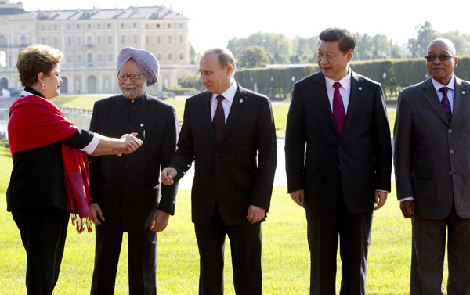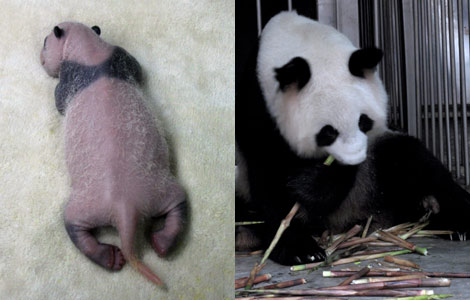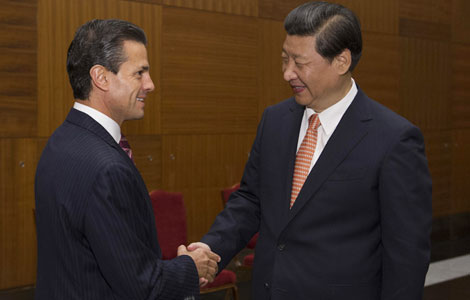Japan to test 'ice wall' for leaking water
Updated: 2013-09-06 03:44
(Agencies)
|
||||||||
Frozen barrier could stop flow of contaminated water into the ocean
The Japanese government will soon conduct a test to build a frozen wall at the leaking Fukushima Daiichi nuclear power plant, as part of a wider plan to prevent leaking radioactive water from flowing into the Pacific Ocean, government officials confirmed on Thursday.
The feasibility test will start by mid-October at the earliest and involve driving steel pipes 30 meters deep into the soil near the No 4 reactor building.
Liquid calcium chloride at minus 40 C will be injected into the pipes to freeze the surrounding soil, with the pipes surrounding an area of just 10 square meters for the purposes of the test.
The trial, which is expect to last for five months, is designed to check whether such an "ice wall" is capable of stopping the flow of contaminated groundwater, said the officials.
Japan's Prime Minister Shinzo Abe, along with Industry Minister Toshimitsu Motegi and other members of the government's nuclear disaster task-force on Tuesday approved the basic plan to construct a 1.4 km-long underground frozen wall around four damaged reactors at the stricken facility.
By freezing the soil around the reactors and creating an ice wall, the government and the task force believe that groundwater will be prevented from mixing with coolant water that is becoming contaminated after coming into contact with melted nuclear fuel.
Under its current plans and provided that the tests prove to be successful, the wall will be operational by the end of March 2015, government officials said on Thursday.
The government has come under increasing pressure to take a more proactive role in tacking the Fukushima crisis after a series of gaffes by the plant's operator, Tokyo Electric Power Co, including hugely inaccurate reporting of radiation levels, shoddy efforts to patch up a leaking tank responsible for 300 tons of toxic water flowing freely into the Pacific, and failing to detect the leak in the first place.
Also on Thursday, the chief of Japan's nuclear watchdog chided the operator of the Fukushima plant for its inability to properly explain problems, which he said was inflating fears around the world.
Shunichi Tanaka, chairman of the Nuclear Regulation Authority, said information given by TEPCO on the level of radioactive contamination was "scientifically unacceptable".
He also lashed out at media coverage of a series of water leaks, saying reports were giving a misleading impression of the seriousness of the situation at the stricken plant.
Tanaka's comments come after TEPCO announced it had detected a hotspot with a reading of 2,200 millisieverts per hour.
"What TEPCO is talking about is the level of contamination," said Tanaka, "Describing it with the unit ‘millisieverts per hour' is scientifically unacceptable."
"It's like describing how much something weighs by using centimeters," he said, adding the unit "becquerel" was more appropriate.
TEPCO has confirmed that a reading of 2,200 millisieverts per hour would be enough to kill a person in a matter of hours.
But experts point out that this reading is taken very close to the source of the radiation. It drops dramatically — to 40 millisieverts per hour — just 50 centimeters away.
And the kind of radiation being emitted is very low energy, which means it is not able to penetrate the body easily.

 China, Russia a step closer on gas supply
China, Russia a step closer on gas supply
 18-year-old panda conceives triplets
18-year-old panda conceives triplets
 Testing times for G20 leaders
Testing times for G20 leaders Homemade choppers make aerobatic stunt debut
Homemade choppers make aerobatic stunt debut
 Shanghai's visa-free policy lifts tourism
Shanghai's visa-free policy lifts tourism
 Panda twin cub born at Atlanta Zoo
Panda twin cub born at Atlanta Zoo
 Xi, Mexican president meet for third time
Xi, Mexican president meet for third time
 Samsung unveils smartwatch ahead of rival Apple
Samsung unveils smartwatch ahead of rival Apple
Most Viewed
Editor's Picks

|

|

|

|

|

|
Today's Top News
Brazil asks for apology from US on spying
Xi calls for closer G20 ties
US service providers eye China
China, Russia a step closer on gas supply
Commuter aviation expected to take flight soon
Japan to test wall for leaking water
18-year-old panda conceives triplets
Films aim for success abroad
US Weekly

|

|






